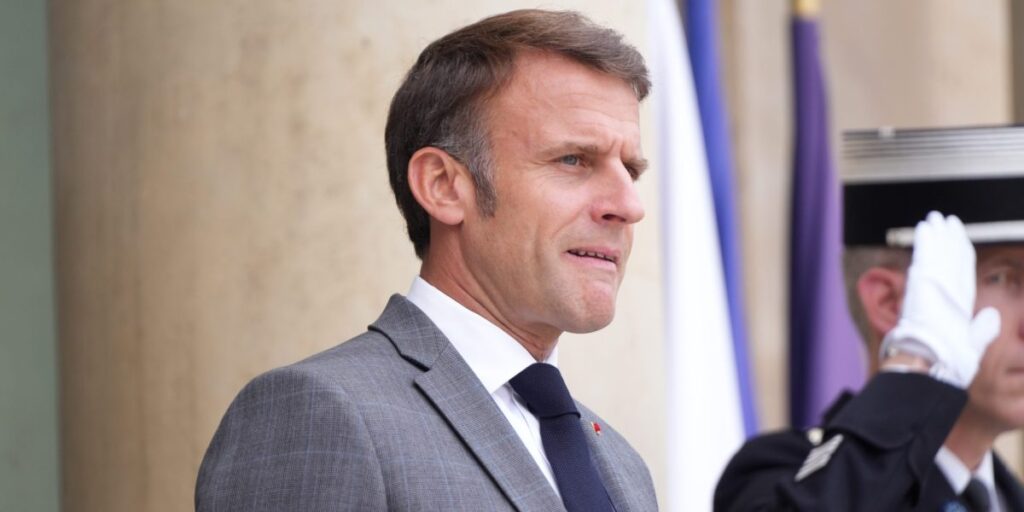
France’s political situation appears to be heading toward instability after a left-wing coalition unexpectedly won Sunday’s legislative election, leaving no party with the majority needed to govern.
The New Popular Front – which includes the Socialists and the far-left French Insubordination party – is expected to win between 171 and 205 seats in the National Assembly. Opinion polls last week showed Marine Le Pen’s National Rally, which won the most seats, was expected to come in third with 130 to 152 seats, while President Macron’s centrist coalition would come in second with 152 to 180 seats. .
If all three groups fall well short of the 289-seat supermajority needed in the 577-seat lower house, it’s unclear how a country with no tradition of coalition governments will form a government capable of passing laws.
French Prime Minister Gabriel Attal announced that he would submit his resignation to Macron on Monday, which will start the process of forming a new government.
The euro fell at the start of trading as investors priced in an outcome that few had expected and renewed concerns about France’s fiscal woes as all sides pledged to significantly increase public spending.
The Montaigne Institute estimates that the new Popular Front’s campaign promises will require nearly 179 billion euros ($194 billion) in additional funding annually. Plans for the far-right national rally will cost around 71 billion euros, with Macron’s party and his allies spending an additional nearly 21 billion euros.
Le Pen gave a positive assessment of the election results, noting that the National Rally had 89 seats in the last legislative body and was expected to gain the most seats of any party.
“The tide is rising,” Le Pen said. “It’s not high enough this time, but it’s still rising.”
The unexpected result meant that no single coalition had enough numbers to govern with an outright majority, splitting the legislature into three distinct groups with different agendas. A statement from Elysee Palace officials said Macron would wait for the new structure of the National Assembly before making further decisions on the appointment of the next prime minister.
France would now be faced with two choices that had little precedent in the history of modern republics. Macron could try to cobble together a coalition among willing but not always like-minded parties, but that would require the New Popular Front to splinter and reconfigure without the support of the president without its more radical elements.
Or Macron could appoint a technocratic government to bridge a period of political turmoil. Both solutions would likely mean a weakened government that would struggle to pass any meaningful legislation and would have less influence on the international stage.
“The lack of a majority and the absence of a government will put France and the French people at great risk,” Macron’s first prime minister, Edouard Philippe, warned on Sunday night. “The central political forces now have an inescapable responsibility: they must work to reach an agreement.” A non-shameful agreement to stabilize the political situation.”
French leader Jean-Luc Mélenchon told supporters on Sunday that his new Popular Front would fully implement its plans and that he would reject a deal with Macron. But Socialist leader Olivier Faure struck a more conciliatory tone, saying the party’s job was to “find a way” to meet the needs and demands of the French people.
French assets plunged four weeks ago after Macron called a snap election, but late last week as traders began to price in a supermajority for Le Pen’s far-right party and come to terms with the prospect of government gridlock. Assets rebounded.
While some traders were relieved by a lower-than-expected seat tally for Le Pen’s party and a gain for Macron’s bloc, a victory for the left-wing bloc could hurt French assets in the coming weeks.
For Vincent Ewings, global market strategist at J.P. Morgan Asset Management, that could be the case with the spread between French and German bond yields, which he believes is widening.
“The European Commission and ratings agencies expect cuts of 20 billion to 30 billion euros, but the government actually has to deal with a party that wants to increase spending by 120 billion euros,” Juvyns said. “This may cause market tensions in the coming weeks. As long as The new government has yet to provide clarity on its fiscal position, and markets are likely to demand higher spreads.
Sunday’s forecast provided some evidence for Macron’s call to dissolve parliament after Le Pen’s party suffered a crushing defeat last month. Le Pen was widely criticized for the decision after finishing a distant third in the first round of voting last week.
The past week has seen frantic efforts to activate the so-called “Republican Front” – an arrangement in which mainstream parties strategically pull candidates out of certain races to boost votes against national rallies. Macron’s party withdrew 76 candidates from a runoff that had little chance of winning to avoid splitting the anti-Le Pen vote. The New Popular Front withdrew 130 people.
National Rally president Jordan Bardera criticized the strategy, saying the Elysee Palace’s carefully planned approach “won’t go anywhere”.
Antonio Barroso, deputy director of research at Teneo, wrote in a report that the formation of a new government will be complex and may take a long time.
“This indecision creates risks for the country that no one should underestimate,” Philip said. “Our country’s credibility could be hit and its credibility destroyed.”

